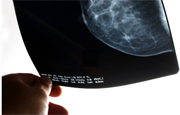Two studies show benefits for hypofractionated vs conventionally fractionated whole-breast irradiation
FRIDAY, Aug. 7, 2015 (HealthDay News) — For women with breast cancer, hypofractionated (HF) whole-breast irradiation (WBI) is associated with reduced toxic effects compared to conventionally fractionated (CF) WBI, according to two studies published online Aug. 6 in JAMA Oncology.
Simona F. Shaitelman, M.D., M.Ed., from the University of Texas MD Anderson Cancer Center in Houston, and colleagues examined acute and six-month toxic effects and quality of life with CF versus HF-WBI. Following breast-conserving surgery, 149 women were assigned to CF-WBI and 138 to HF-WBI. The researchers found that patients randomized to HF-WBI had lower maximum physician-reported acute dermatitis, pruritus, breast pain, hyperpigmentation, and fatigue during irradiation. The patients also had a lower rate of overall grade 2 or higher acute toxic effects. At six months after irradiation, patients randomized to HF-WBI had less fatigue, reported less lack of energy, and had less trouble meeting family needs.
Reshma Jagsi, M.D., D.Phil., from the University of Michigan in Ann Arbor, and colleagues compared toxic effects in patients receiving HF versus CF during treatment and follow-up in practices collaborating in the Michigan Radiation Oncology Quality Consortium (MROQC). Of the 2,309 patients who could be evaluated, 578 received HF. Patients receiving CF had significantly higher maximum physician-assessed skin reaction, self-reported pain, burning/stinging bother, hurting bother, swelling bother, and fatigue. During follow-up there was slightly greater absence of skin induration with CF.
“Hypofractionation not only improves convenience but also may reduce acute pain, fatigue, and the extent to which patients are bothered by dermatitis in patients with breast cancer undergoing whole-breast radiotherapy,” Jagsi and colleagues write.
Several authors from the Shaitelman study disclosed financial ties to the pharmaceutical industry. Funding for MROQC in the Jagsi study was provided by the Blue Cross Blue Shield of Michigan and Blue Care Network.
Copyright © 2015 HealthDay. All rights reserved.








